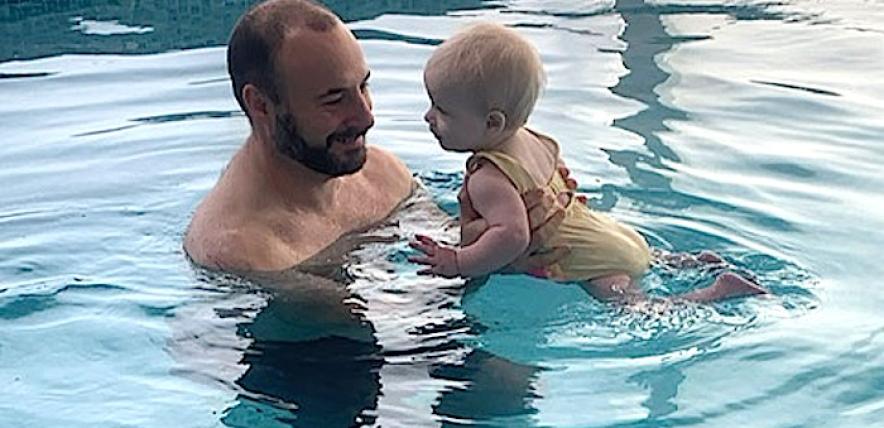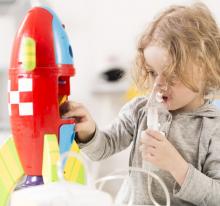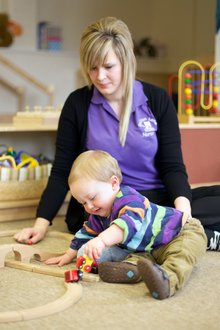by Nicole Weinstein
Your baby is ready to start swimming lessons as soon as you are.
Babies are allowed to go into the pool from birth, despite not having their immunisations, according to NHS guidelines. (Of course, it’s best to check with your health visitor if you have any concerns or if your baby was born premature.)
Most baby swimming classes start from around three months.
Water temperature is key, as babies can’t regulate their body temperature in the same way as adults.
For babies under six months, look for pools that are heated to around 32°C.
Large, public pools are often a few degrees colder and even if you invest in a baby wetsuit, it’s likely to be too cold.
Remember, if they start to shiver, take them out immediately and wrap them up warmly.
Getting babies ready for swimming and building water confidence
If you’re not quite ready to take the plunge with your baby at the pool, there are plenty of things that you can do at home to build up water confidence.
At bath time, try kicking your baby’s legs while singing a song and splashing about or try floating your baby on their back – see the instruction videos on Water Babies’ YouTube channel.
Check swimming instructors' qualifications
Once you feel ready to sign up for baby swimming lessons, don’t be afraid to ask what qualifications the instructors hold.
Katie Towner, Swim England’s Head of Learn to Swim, says in her blog for Water Babies, that lessons should always be run by teachers holding an industry-recognised swimming qualification, such as the Swim England Level 2 Teaching Swimming to Babies and Toddlers and there should also be a trained lifesaver and first aid member of staff available at all times throughout the class.
Swim England is one of two national bodies providing information for parents about swimming with babies and children.
The other is the Swimming Teachers’ Association. Both bodies run accredited swimming courses.
Sue Keith runs Sue’s Swim School and has over 45 years’ experience of teaching babies and children to swim and coaching international-level swimmers. She is accredited with both Swim England and the Swimming Teachers’ Association.
She said: "When it comes to babies and young children, it’s about introducing them to the aquatic environment rather than swimming ‘lessons’. Our baby and toddler sessions are child-led and we introduce children to the water in a relaxed way. We encourage them to use their grip reflex, so that they can learn to hold on to the side of the wall or their parents from a very early age, which is a vital lifesaving skill in itself.’
How to find baby swimming lessons
- Better is the largest provider of swimming lessons in the UK. Lessons start at age three months and the swim school programme has been designed to be flexible and affordable, with prices starting from £3 per lesson, depending on location.
- Speedo swimwear has partnered with Better and the Black Swimming Association to offer £10 off continuous swimming courses with the code SPEEDO, after research found that one in four children leave school unable to swim, the majority of which are from socially disadvantaged or ethnic backgrounds.
- Check for local private lessons with accredited swimming teachers specialising in babies and toddlers.
Find organisations that offer baby swimming courses in the UK:
- www.waterbabies.co.uk
- www.swimtime.org
- www.turtletots.com
- www.aquatots.com
- www.swimkidz.co.uk
- www.swimbabeslessons.co.uk
- www.littledippers.co.uk
- www.puddleducks.com
- www.aquatic-harmony.com
Getting ready for baby swimming lessons
- It’s a good idea to check out the changing rooms and familiarise yourself with the facilities before you take your baby swimming for the first time. The prospect of getting yourself and your baby ready may feel daunting – and it’s best to start off calm and relaxed.
- Check to see if the changing rooms have somewhere safe for you to put the baby down — a playpen, a changer or a chair with a harness — while you pack bags, put things in lockers or change your own clothes if you're getting into the water too.
- Leave plenty of time to get ready — if you're late things could get stressful. Allow time for getting changed and any nappy changes.
- Don’t forget swimming nappies. You can buy reusable ones or disposables.
- A hooded towel is useful to pop over children's heads when they come out as they won't fall off when you're drying them.
- Don't forget a plastic bag to take wet swim things home.
Case study: Saffy's swimming lessons
Ten-month old Saffron, pictured above, attended her first swimming lesson with Sue’s Swim School at the age of four months.
Her lessons take place in a private pool in Helston, Cornwall.
Growing up near the sea, her parents were keen to get her used to the water as early as possible.
Her father, Andy, is a qualified Royal Lifesaving Society and Surf Lifesaving Great Britain beach lifeguard instructor who volunteers at weekends to train children in water safety on Cornish beaches.
He says: "Swimming is a vital life skill and having water confidence enables you to live a life full of aquatic adventures, such as surfing, paddle boarding and kayaking in later life, which is very much a part of our lives, living near the sea."
Her mum, Louise, says: "The lessons are really fun and relaxed and it’s a great chance to bond with your child in the water, which is very natural place for them to be."
Swimming is a great activity for strengthening children's muscles and improving their coordination and balance.
And after all the splashing around and blowing bubbles in the water, most babies have a great sleep afterwards.








